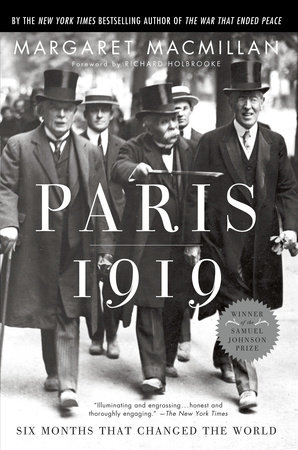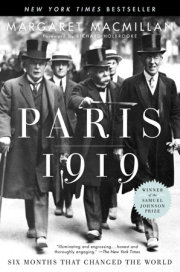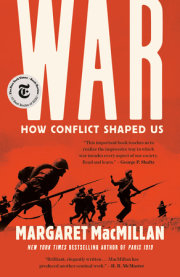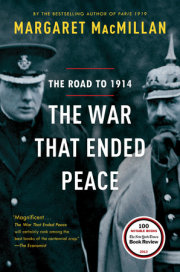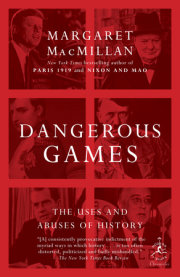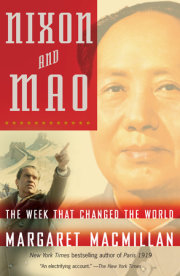Chapter 1Woodrow Wilson Comes to EuropeOn december 4, 1918, the George Washington sailed out of New York with the American delegation to the Peace Conference on board. Guns fired salutes, crowds along the waterfront cheered, tugboats hooted and Army planes and dirigibles circled overhead. Robert Lansing, the American secretary of state, released carrier pigeons with messages to his relatives about his deep hope for a lasting peace. The ship, a former German passenger liner, slid out past the Statue of Liberty to the Atlantic, where an escort of destroyers and battleships stood by to accompany it and its cargo of heavy expectations to Europe.
On board were the best available experts, combed out of the universities and the government; crates of reference materials and special studies; the French and Italian ambassadors to the United States; and Woodrow Wilson. No other American president had ever gone to Europe while in office. His opponents accused him of breaking the Constitution; even his supporters felt he might be unwise. Would he lose his great moral authority by getting down to the hurly-burly of negotiations? Wilson¹s own view was clear: the making of the peace was as important as the winning of the war. He owed it to the peoples of Europe, who were crying out for a better world. He owed it to the American servicemen. "It is now my duty," he told a pensive Congress just before he left, "to play my full part in making good what they gave their life's blood to obtain." A British diplomat was more cynical; Wilson, he said, was drawn to Paris "as a debutante is entranced by the prospect of her first ball."
Wilson expected, he wrote to his great friend Edward House, who was already in Europe, that he would stay only to arrange the main outlines of the peace settlements. It was not likely that he would remain for the formal Peace Conference with the enemy. He was wrong. The preliminary conference turned, without anyone's intending it, into the final one, and Wilson stayed for most of the crucial six months between January and June 1919. The question of whether or not he should have gone to Paris, which exercised so many of his contemporaries, now seems unimportant. From Franklin Roosevelt at Yalta to Jimmy Carter or Bill Clinton at Camp David, American presidents have sat down to draw borders and hammer out peace agreements. Wilson had set the conditions for the armistices which ended the Great War. Why should he not make the peace as well?
Although he had not started out in 1912 as a foreign policy president, circumstances and his own progressive political principles had drawn him outward. Like many of his compatriots, he had come to see the Great War as a struggle between the forces of democracy, however imperfectly represented by Britain and France, and those of reaction and militarism, represented all too well by Germany and Austria-Hungary. Germany's sack of Belgium, its unrestricted submarine warfare and its audacity in attempting to entice Mexico into waging war on the United States had pushed Wilson and American public opinion toward the Allies. When Russia had a democratic revolution in February 1917, one of the last reservations that the Allies included an autocracy vanished. Although he had campaigned in 1916 on a platform of keeping the country neutral, Wilson brought the United States into the war in April 1917. He was convinced that he was doing the right thing. This was important to the son of a Presbyterian minister, who shared his father's deep religious conviction, if not his calling.
Wilson was born in Virginia in 1856, just before the Civil War. Although he remained a Southerner in some ways all his life‹in his insistence on honor and his paternalistic attitudes toward women and blacks he also accepted the war's outcome. Abraham Lincoln was one of his great heroes, along with Edmund Burke and William Gladstone. The young Wilson was at once highly idealistic and intensely ambitious. After four very happy years at Princeton and an unhappy stint as a lawyer, he found his first career in teaching and writing. By 1890 he was back at Princeton, a star member of the faculty. In 1902 he became its president, supported virtually unanimously by the trustees, faculty and students.
In the next eight years Wilson transformed Princeton from a sleepy college for gentlemen into a great university. He reworked the curriculum, raised significant amounts of money and brought into the faculty the brightest and the best young men from across the country. By 1910, he was a national figure and the Democratic party in New Jersey, under the control of conservative bosses, invited him to run for governor. Wilson agreed, but insisted on running on a progressive platform of controlling big business and extending democracy. He swept the state and by 1911 "Wilson for President" clubs were springing up. He spoke for the dispossessed, the disenfranchised and all those who had been left behind by the rapid economic growth of the late nineteenth century. In 1912, at a long and hard-fought convention, Wilson got the Democratic nomination for president. That November, with the Republicans split by Teddy Roosevelt's decision to run as a progressive against William Howard Taft, Wilson was elected. In 1916, he was reelected, with an even greater share of the popular vote.
Wilson's career was a series of triumphs, but there were darker moments, both personal and political, fits of depression and sudden and baffling illnesses. Moreover, he had left behind him a trail of enemies, many of them former friends. "An ingrate and a liar," said a Democratic boss in New Jersey in a toast. Wilson never forgave those who disagreed with him. "He is a good hater," said his press officer and devoted admirer Ray Stannard Baker. He was also stubborn. As House said, with admiration: "Whenever a question is presented he keeps an absolutely open mind and welcomes all suggestion or advice which will lead to a correct decision. But he is receptive only during the period that he is weighing the question and preparing to make his decision. Once the decision is made it is final and there is an absolute end to all advice and suggestion. There is no moving him after that." What was admirable to some was a dangerous egotism to others. The French ambassador in Washington saw "a man who, had he lived a couple of centuries ago, would have been the greatest tyrant in the world, because he does not seem to have the slightest conception that he can ever be wrong."
This side of Wilson¹s character was in evidence when he chose his fellow commissioners‹or plenipotentiaries, as the chief delegates were known‹to the Peace Conference. He was himself one. House, "my alter ego," as he was fond of saying, was another. Reluctantly he selected Lansing, his secretary of state, as a third, mainly because it would have been awkward to leave him behind. Where Wilson had once rather admired Lansing's vast store of knowledge, his meticulous legal mind and his apparent readiness to take a back seat, by 1919 that early liking had turned to irritation and contempt. Lansing, it turned out, did have views, often strong ones which contradicted the president's. "He has," Wilson complained to House, who noted it down with delight, "no imagination, no constructive ability, and but little real ability of any kind." The fourth plenipotentiary, General Tasker Bliss, was already in France as the American military representative on the Supreme War Council. A thoughtful and intelligent man who loved to lie in bed with a hip flask reading Thucydides in the original Greek, he was also, many of the junior members of the American delegation believed, well past his prime. Since Wilson was to speak to him on only five occasions during the Peace Conference, perhaps that did not matter.
The president's final selection, Henry White, was a charming, affable retired diplomat, the high point of whose career had been well before the war. Mrs. Wilson was to find him useful in Paris on questions of etiquette.
Copyright © 2002 by Margaret MacMillan. All rights reserved. No part of this excerpt may be reproduced or reprinted without permission in writing from the publisher.

